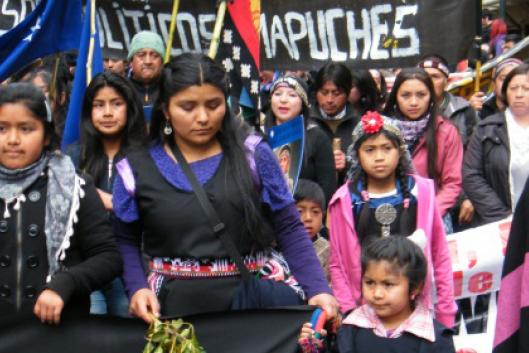Throughout history, indigenous women have been committed to the struggles of their peoples and communities, although often their contribution has been invisible in the dominant official version of history.
Indigenous Mapuche women like Fresia, Guacolda or Janequeo won renown for their bravery in battle against the Spanish colonizers. They inspired chroniclers like Alonso de Ercilla y Zúñiga to write his epic work “La Araucana,” which recognizes and sympathizes with the indigenous peoples’ claims in its narration of the war between Spaniards and Mapuche.
In Chile today, peasant and indigenous women continue fighting different problems, such as the serious drought that is affecting springs and wetlands, or the disappearance of medicinal plants, which impacts upon the role of the “machi” (traditional Mapuche healers, usually women). Most of these situations have been caused by forestry companies and their industrial plantations of eucalyptus and pine trees. The Chilean state, in turn, has encouraged these companies’ actions by subsidizing them under decree 701, introduced under the Pinochet dictatorship and still in force.
Further problems include land scarcity, impoverishment of the communities, migration of women and young people to the big cities, and seasonal migration of farm workers to the centre-south of the country as wage labour for transnational companies. Here they are exposed to pesticides and endure appalling working conditions. Meanwhile, the country prides itself on exporting the best wine and fruit to European markets, but does not promote public policies to protect peasant and indigenous women and put a stop to their exploitation.
A number of women’s assemblies and meetings are demanding a new society without capitalism, free from both oppression and machismo. They are calling for a new and more equitable society in which diversity in all its forms is respected and there is full harmony with mother nature.
Women’s and indigenous peoples’ organizations emerged in the 1990s in Chile and in many other countries in the region, in the context of a return to post-dictatorship democratic governments, after the implementation of neoliberal economic policies which privatized most natural resources, and that are still supported by present-day states.
In Chile’s case, indigenous women’s organizations were first promoted by the state under the 1993 Indigenous Peoples Act No. 19,253. There were several reasons why they appeared at this time, including access to state resources, lack of opportunities in mixed organizations and the need to address specific issues such as sexual and reproductive health and intra-family violence.
In order to make their demands more visible, indigenous women felt it necessary to make alliances with other rural organizations. In 1998 the National Association of Rural and Indigenous Women (ANAMURI) was created, which in turn is part of networks like the Latin American Coordinating Committee of Rural Organizations (CLOC) and the global organization Via Campesina. From these platforms, indigenous women voice their criticism of current state policies and development programs, and forcefully confront the present neoliberal economic system that excludes and marginalizes them and attempts to assimilate them into a single homogeneous cultural identity.
One of the debates present within grassroots organizations is related to the proposal on “Peasant and popular feminism” which emerged at CLOC’s Fourth Women’s Assembly and the Fifth CLOC Congress, held in October 2010 in Quito, Ecuador.
It is important to say that frequently some concepts are assumed as true without an in-depth analysis of their meanings. This led indigenous women belonging to ANAMURI to make an assembly in 2013 to discuss the concepts they regard as alien to their culture and requiring further debate. For many leaders, although they recognize the contribution of the feminist movement in all its variety, the word “feminism” is still violent and they resist being referred to as “indigenous feminists”. What they seek, rather, is balance and complementarity between men and women, the old and the young, and harmony with nature: these are constitutive elements of their worldview.
Mapuche women have historically resisted the Spanish crown and the subsequent nation states which tried to folklorize and commercialize their customs and traditions. In the present context of capitalism and globalization, these indigenous women consider it essential to connect the struggles of peasants and native peoples, and to seek alliances with sectors of the urban population that suffer discrimination.
To conclude, indigenous women will continue to defend their cultures, traditions, and the rights of their peoples, and to strengthen spirituality for good living in harmony with nature. Together with other social movements they will continue to resist and raise their voices against capitalism, buoyed by the hope that nothing is written in stone and everything can change.
Millaray Painemal Morales, founding member of ANAMURI
koigueche@yahoo.es
